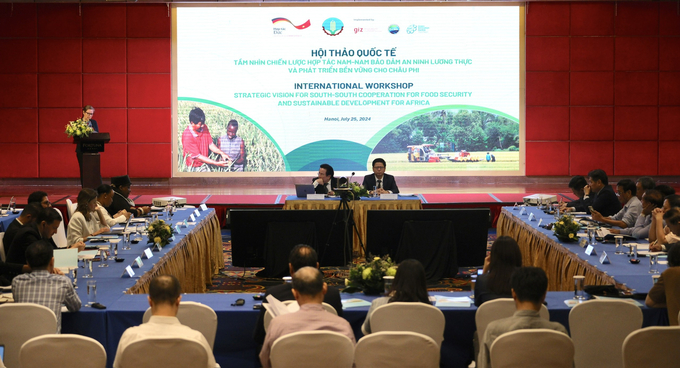November 19, 2025 | 02:14 GMT +7
November 19, 2025 | 02:14 GMT +7
Hotline: 0913.378.918
November 19, 2025 | 02:14 GMT +7
Hotline: 0913.378.918

MARD and GIZ held an International Workshop on “Strategic Vision for South-South Cooperation for Food Security and Sustainable Development for Africa” on July 25 in Hanoi. Photo: Quynh Chi.
This event underscores Vietnam's commitment to leveraging its agricultural expertise to foster South-South cooperation.
The origins of South-South Cooperation (SSC) can be traced back to the Asian-African Conference, also known as the Bandung Conference, held in Bandung, Indonesia, in 1955. This historic conference saw 29 Asian and African countries convene to discuss prospects for cooperation among developing countries. SSC was defined as a mechanism to promote cooperation, share knowledge, experience, skills, and good practices, and to advance science and technology. This includes the exchange of experts in agriculture, healthcare, and climate change.
Dr. Pham Ngoc Mau, Deputy Director of the International Cooperation Department (MARD), highlighted that over the past 60 years, the SSC agenda has provided tailored solutions for global challenges. These include sharing best practices, sponsoring pilot projects, providing capital for successful project expansions, and developing and applying appropriate technologies. SSC remains a significant component of global partnerships for common development. In today’s rapidly changing and unpredictable world, characterized by climate change, epidemics, food crises, poverty, conflict, and the effects of the Fourth Industrial Revolution and digital transformation, South-South cooperation is more crucial than ever to achieve the Sustainable Development Goals (SDGs) by 2030.

Dr. Pham Ngoc Mau, Deputy Director of the International Cooperation Department (MARD) stated that Vietnam is prepared and dedicated to extending South-South cooperation to assist African states in achieving food transformation, providing food security for sustainable and prosperous development. Photo: Quynh Chi.
Vietnam has actively participated and integrated deeply into South-South development cooperation with African countries, building on a foundation of strong traditional relationships. Over the past 60 years, this cooperation has yielded significant achievements, particularly in agriculture, education, and healthcare.
In agriculture, Vietnam has dispatched over 2,000 experts to several African countries, including Sierra Leone, Benin, Madagascar, Guinea, Sudan, Tanzania, Mozambique, and Angola. These experts have assisted in rice cultivation, aquaculture, and sustainable agricultural development. This cooperation has substantially increased rice yields in many African countries, with productivity exceeding 5 tons per hectare, more than three times the previous yield.
Despite these successes, the number of SSC projects in agriculture between Vietnam and Africa remains modest and does not fully reflect the potential and expectations of both governments and their people.
Africa's agricultural potential is immense, with approximately 1 billion hectares of agricultural land, according to FAO statistics. However, the continent faces severe food crises, leading to increased hunger and undernutrition. These challenges are exacerbated by climate change, conflicts, epidemics, and notably the Russia-Ukraine war, which has severely impacted food supplies in some African countries.
With Vietnam's experience and good practices, from a food-scarce country, in the past 30 years, Vietnam has become the 2 largest rice exporter in the world after Thailand. In 2023, Vietnam's rice export turnover will reach 8.13 million tons with a value of 4.67 billion USD, an increase of 4% in volume and 35.3% in value compared to 2022. At the beginning of 2024, Vietnam has implemented a sustainable development project of 1 million hectares of high-quality, low-emission specialized rice associated with green growth in the Mekong Delta by 2030, promising a future of outstanding and sustainable growth for rice production, contributing to ensuring food security for Vietnam and the world.
"Africa should promptly harness its human capital and natural resources to effectively, inclusively, flexibly, and sustainably restructure its food system in order to address various challenges and assure food security. Vietnam is prepared and dedicated to extending South-South cooperation to assist African states in achieving food transformation, providing food security for sustainable and prosperous development. Vietnam's expertise, along with international backing, will contribute to this effort", Mr. Mau stated.
The workshop, exemplifies Vietnam and its international partners' commitment to promoting SSC, supporting development, and ensuring food security for Africa. This workshop aims to open new avenues for close SSC between Vietnam and African countries, as well as trilateral cooperation among Vietnam, Africa, and international partners, fostering prosperity and sustainable development for all parties involved.
Translated by Linh Linh

(VAN) Deputy Prime Minister Tran Hong Ha convened a meeting with the MAE and relevant agencies to discuss the draft decree on national multidimensional poverty standards for the 2026 - 2030 period.

(VAN) The year 2025 marks the 10th anniversary since more than 190 countries adopted the Paris Agreement on climate change, paving the way for strengthened global action.

(VAN) The PepsiCo Foundation funded the project ‘New Harvest: Sustainable Agriculture Initiative’, focusing on regenerative agriculture and climate change.

(VAN) Dr. Nguyen Viet Hung, ILRI's Regional Director for Asia, emphasized the One Health approach in ensuring food safety and reducing antimicrobial resistance risks in livestock.

(VAN) The youth-driven initiative ‘Innovate for water, act for the future’ seeks practical, scalable solutions to Vietnam’s water challenges.

(VAN) At the Annual Science Conference of Thuyloi University, Deputy Minister Phung Duc Tien directed researchers to focus on in-depth studies, data harmonization, and solutions linked to real-world practice.

(VAN) After nearly four years of implementation, 5,187 community agricultural extension groups have been established nationwide, with 47,493 members participating.